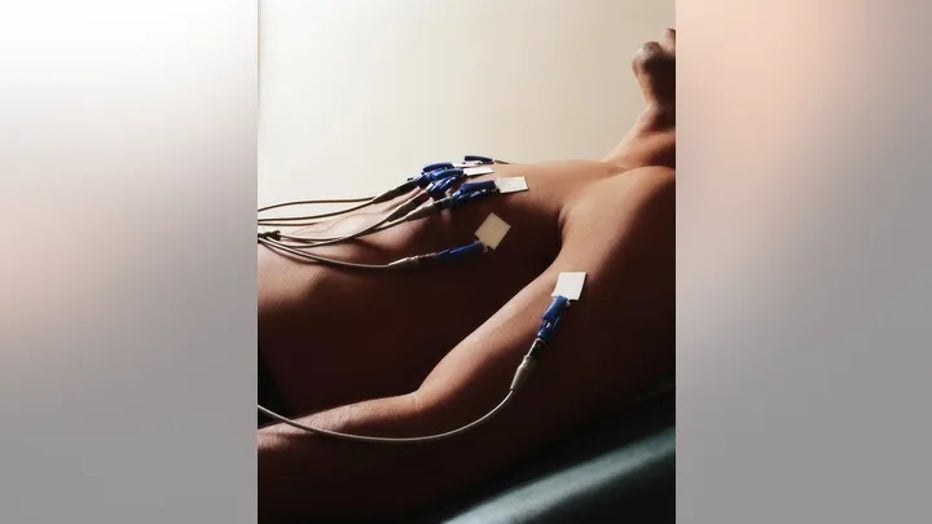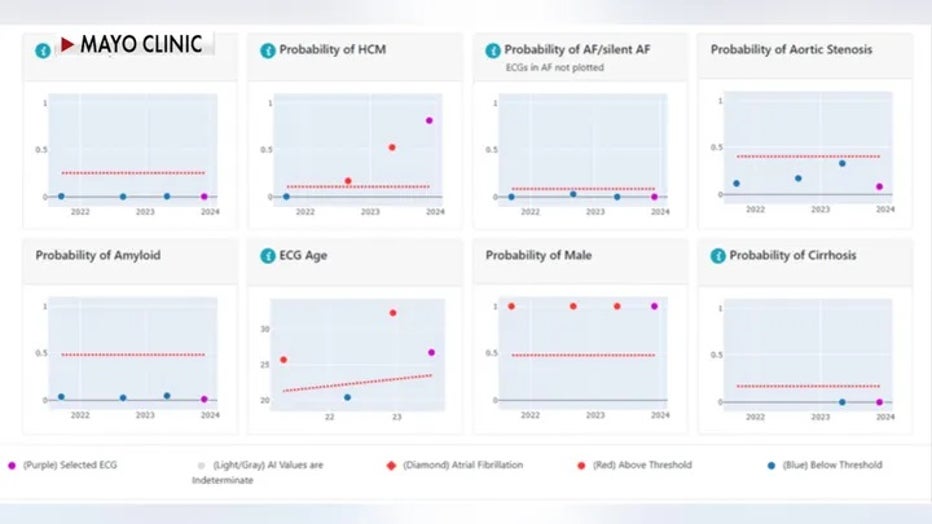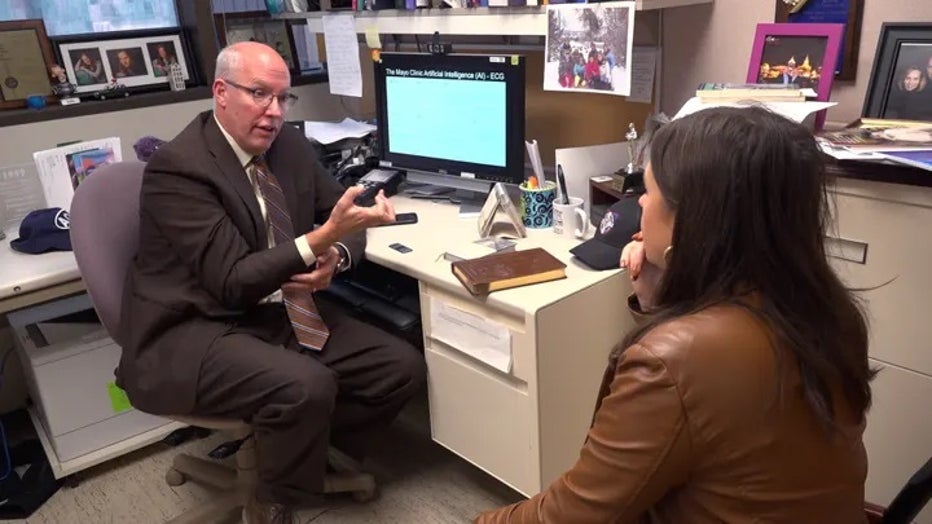Doctors say AI is a 'game-changer' for number 1 killer of Americans
Heart disease is the number one killer of Americans. It’s responsible for one in five deaths.
At the Mayo Clinic in Rochester, Minnesota, they’re using AI to screen for heart problems, in hopes of saving some lives.
Over two hundred miles north at the University of Minnesota-Duluth, the football team is dealing with a recent heart tragedy. According to a family obituary, 22-year-old Reed Ryan went into cardiac arrest on Nov. 21 following a team workout. Less than a week later, Ryan passed away from an undetected genetic heart condition.
"He helped bring out the best in others with his positive attitude, infectious smile, and genuine care for the people around him," UMD head football coach Curt Wiese said. "This will hurt forever. This isn’t something that’s a week and a heal."
HOW AI IS REVOLUTIONIZING THE WORLD OF MEDICINE
In July, basketball legend LeBron James’s son and USC Trojan college basketball player Bronny James suffered a cardiac arrest at a workout practice. Dr. Michael J. Ackerman at Mayo Clinic was one of the doctors who evaluated James a month later. Doctors found the likely cause of the younger James’ cardiac arrest was congenital heart defect.
Advocates say response to a cardiac arrest is also key, which is why many states have increased the number of AEDs in public places and schools have required CPR training. But sometimes a quick response can only do so much, when a heart condition is undetected in screening.

A 12-lead ECG has been used by doctors for over 100 years. Now some doctors are ditching the wires for AI-enabled digital stethoscopes and mobile devices that pick up ECGs. (Copyright: Getty Images)
"From everything that I've read, it sounds like it was a perfectly executed rescue drill that just tragically did not recover this young man," Ackerman said about Reed Ryan.
While seeing a healthy, fit person die suddenly is shocking and tragic, Dr. Ackerman says it’s not just athletes who have to worry about sudden cardiac arrest.
"If you look at all of us, about one and 200 humans, have something really important going on with their heart that if we could identify it, we would want to find that," Dr. Michael Ackerman said, adding that there’s only about 100 sudden death tragedies of athletes a year. In comparison, about 1,000-5,000 people between the ages 1-35 die from a sudden death each year.
BILL GATES ON AI: WE HAVE TO STAY AHEAD OF THE BAD GUYS
But Ackerman is hopeful that the introduction of artificial intelligence is a "game changer" in treating heart conditions.
Doctors use 12-lead electrocardiograms, or ECG’s (EKG’s) to record the heart’s electrical activity. Cardiologist Michael Ackerman helped train artificial intelligence to scan those recordings. The AI looks for more than a dozen heart conditions that could lead to sudden cardiac arrest. For example, it can detect a weak heart pump that can lead to heart failure if left untreated.

The Mayo Clinic's AI technology screens a patient's ECG and flags certain heart issues for secondary review. Dr. Ackerman says this will cut costs of screenings. "I bet you we are maybe three years away or less from having that made its way through c
Ackerman showed Fox an example of an anonymous patient’s ECG and the results from the AI scan.
"That person who's complaining of exercise related shortness of breath, the ECG didn't call him out, didn't identify him as potentially guilty with hypertrophic cardiomyopathy but the AI ECG just did," Ackerman said about the technology.
AI TO HELP SIGNIFICANTLY WITH MEDICAL TRIALS’ PATIENT SELECTION: DR. KEVIN CAMPBELL
There is already a shortage of cardiologist. The Association of American Medical Colleges predicts there will be a shortage of over 120,000 cardiologists in the next 10 years.
Dr. Ackerman says AI helps make up for that shortage, because it can detect problems faster and more accurately.
"We have this we have the tool that does the initial screening, and then it streamlines it dismisses 99% of humans and it flags 1 percent," Ackerman said.

"We've got several of the things that can cause sudden death in the young tuned to the AI brain," Dr. Ackerman says about Mayo Clinic's AI enhanced ECGs. They hope to have all of the major causes of sudden death on the AI ECG screen package when it's
It’s not just AI enhanced ECG’s. Under Ackerman’s direction, Mayo Clinic and AliveCor Inc. developed a mobile device that can identify certain patients at risk for sudden cardiac death. AliveCor’s KardiaMobile 6L EKG device can detect multiple heart conditions. Ackerman says they just received FDA approval for it to detect long QT syndrome.
"Our previous reasons for not screening for long QT like there's not enough pediatric cardiologists to look at the 12 lead ECG. Those arguments are starting to collapse," Ackerman said. "That one if you found it, you almost always, always intercept and prevent a tragedy of sudden death."
AI developed at Mayo Clinic is also used in Apple Watch to detect a weak heart pump. Mayo research also found that an AI-enabled digital stethoscope can detect pregnancy-related heart disease.
Researchers, doctors and businesses are racing to detect heart failure early through artificial intelligence before worsening of heart failure results in hospitalization.
San Francisco software company, Viz.ai, received De Novo approval by the FDA for their hypertrophic cardiomyopathy (HCM) AI detection algorithm.
At the University of Pittsburgh Medical Center, a new machine learning model uses ECG readings to diagnose and classify heart attacks faster and more accurately. It hasn’t been used in direct patient care yet, but the research is promising.
In November, Cordio Medical, developer of the HearO app, presented positive results of a clinical study. The HearO app allows patients to speak into their smartphone and the AI can detect changes that may be indicative of worsening heart failure. Dr. William T. Abraham, College of Medicine Distinguished Professor at The Ohio State University Wexner Medical Center and the study’s lead researcher, said he expects this to be available in the U.S. in the next year or two.
GET FOX BUSINESS ON THE GO BY CLICKING HERE
For Ackerman, artificial intelligence brings hope.
"These solutions are starting to totally change the landscape," Ackerman said. "With respect to screening for these sudden death predisposing heart conditions for which most of them are incredibly treatable when we know of their existence."
The AI guided ECG’s at Mayo Clinic are available to any Mayo patient who gets a 12-Lead ECG. They are working on developing and validating algorithms to evaluate ECGS from mobile devices on their dashboard too. Mayo Clinic doctors say the technology is about 3 years out from FDA approval for wide use across the country.
LINK: Get updates and more on this story at foxbusiness.com.

